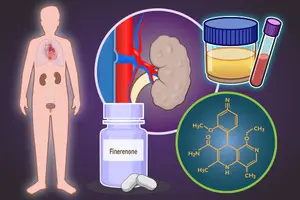- Home
- Medical news & Guidelines
- Anesthesiology
- Cardiology and CTVS
- Critical Care
- Dentistry
- Dermatology
- Diabetes and Endocrinology
- ENT
- Gastroenterology
- Medicine
- Nephrology
- Neurology
- Obstretics-Gynaecology
- Oncology
- Ophthalmology
- Orthopaedics
- Pediatrics-Neonatology
- Psychiatry
- Pulmonology
- Radiology
- Surgery
- Urology
- Laboratory Medicine
- Diet
- Nursing
- Paramedical
- Physiotherapy
- Health news
- Fact Check
- Bone Health Fact Check
- Brain Health Fact Check
- Cancer Related Fact Check
- Child Care Fact Check
- Dental and oral health fact check
- Diabetes and metabolic health fact check
- Diet and Nutrition Fact Check
- Eye and ENT Care Fact Check
- Fitness fact check
- Gut health fact check
- Heart health fact check
- Kidney health fact check
- Medical education fact check
- Men's health fact check
- Respiratory fact check
- Skin and hair care fact check
- Vaccine and Immunization fact check
- Women's health fact check
- AYUSH
- State News
- Andaman and Nicobar Islands
- Andhra Pradesh
- Arunachal Pradesh
- Assam
- Bihar
- Chandigarh
- Chattisgarh
- Dadra and Nagar Haveli
- Daman and Diu
- Delhi
- Goa
- Gujarat
- Haryana
- Himachal Pradesh
- Jammu & Kashmir
- Jharkhand
- Karnataka
- Kerala
- Ladakh
- Lakshadweep
- Madhya Pradesh
- Maharashtra
- Manipur
- Meghalaya
- Mizoram
- Nagaland
- Odisha
- Puducherry
- Punjab
- Rajasthan
- Sikkim
- Tamil Nadu
- Telangana
- Tripura
- Uttar Pradesh
- Uttrakhand
- West Bengal
- Medical Education
- Industry
Finerenone Shows Promise for Non-Diabetic CKD Patients: Study

Real-world data suggest that finerenone is both effective and safe for patients with non-diabetic chronic kidney disease (CKD), although larger prospective studies are necessary to validate these results. The findings of the study have been published in BMC Nephrology.
Finerenone, a novel non-steroidal mineralocorticoid receptor antagonist, has shown promising efficacy and safety profiles in the management of chronic kidney disease (CKD) associated with type 2 diabetes mellitus (T2DM). However, evidence for its role in non-diabetic CKD patients require further investigation.
This retrospective, real-world study involved non-diabetic CKD patients from April 2023 to June 2024. Participants received finerenone alongside standard CKD treatment. Primary clinical results included changes in the urinary albumin-to-creatinine ratio (UACR), estimated glomerular filtration rate (eGFR), and serum potassium (sK+) levels. The data were collected initially and during follow-ups at 1, 3, 6, and 12 months.
Results: In total, 37 non-diabetic CKD patients were included in the population; 21 individuals (56.8%) were male, and the mean age was 48.84 ± 14.69 years. During the follow-up, there was a notable decrease in UACR, with a median reduction of 664.95 mg/g (IQR, 196.60-1226.70, P = 0.002). The baseline average eGFR was 70.80 ± 27.97 mL/min/1.73m2, with no notable alterations observed during the follow-up (P > 0.05). In terms of safety analysis, the sK + levels were within the 3.5–5.5 mmol/L range, with no significant difference from the baseline (P > 0.05). No patients discontinued treatment or were hospitalized because of hyperkalemia.
Real-world practice indicates that finerenone is effective and safe for non-diabetic CKD patients, but further large-scale, prospective studies are needed to confirm these findings.
Reference:
Li, Y., Feng, J., Guo, X. et al. Efficacy and safety of finerenone in non-diabetic CKD patients: a single-center, real-world, retrospective study. BMC Nephrol 26, 323 (2025). https://doi.org/10.1186/s12882-025-04241-w
Dr. Shravani Dali has completed her BDS from Pravara institute of medical sciences, loni. Following which she extensively worked in the healthcare sector for 2+ years. She has been actively involved in writing blogs in field of health and wellness. Currently she is pursuing her Masters of public health-health administration from Tata institute of social sciences. She can be contacted at editorial@medicaldialogues.in.
Dr Kamal Kant Kohli-MBBS, DTCD- a chest specialist with more than 30 years of practice and a flair for writing clinical articles, Dr Kamal Kant Kohli joined Medical Dialogues as a Chief Editor of Medical News. Besides writing articles, as an editor, he proofreads and verifies all the medical content published on Medical Dialogues including those coming from journals, studies,medical conferences,guidelines etc. Email: drkohli@medicaldialogues.in. Contact no. 011-43720751


